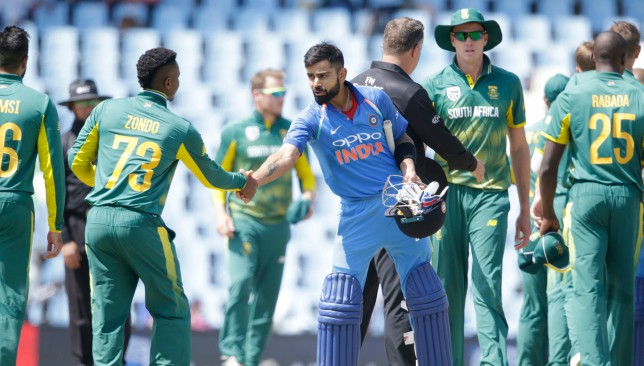
Sometimes in life, a bit of common sense can go a long way rather than getting too bogged down by regulation. Rules are there for a reason but as the saying goes, sometimes you have to bend them. That should have been the case during the second ODI between South Africa and India at SuperSport Park on Sunday.
Needing just two runs to win and chasing a modest 119 for victory, the Men in Blue were in cruise control to put it mildly at 117-1 in the 19th over when the umpires took the players off the field for a 40-minute lunch break. It was an astonishing sight but the officials had stuck to the letter of the law having already allowed an extended period of four extra overs (equivalent to 15 minutes) when India were 93-1 in order for them to get the winning runs required.
As it was, they should have just played on that bit longer. With Virat Kohli and Shikhar Dhawan at the crease, the match would have been done almost instantly if another ball was bowled but umpires Aleem Dar and Adrian Holdstock stuck to the lawbook. You could say the two men in the middle were just doing their job but the point is greater than that.
There weren’t many people left in the ground to see India sew up a nine-wicket win as most had gone home – plus millions more on TV probably switched off. Indeed, West Indies great Michael Holding labelled the umpires’ call as a “ridiculous decision” and the fast bowling legend has long called for changes at the top of the ICC, given he knows well how a nation can quickly decline in cricketing stature.
On the surface, the game may seem in rude health with the riches of Twenty20 leagues but Test cricket, in particular, is on its knees apart from the big series. Falling crowds, placid batting-friendly pitch conditions the world-over, the size of bats, unbalanced use of technology, meaningless and overplayed series as well as the dominance of the big three in terms of financial clout: India, England and Australia – the list goes on. These are the real key issues to tackle and what we saw in Centurion leaves a sour taste in the mouth.

South Africa learning from post-Graeme Smith captaincy vacuum in appointing young Aiden Markram
Changes to the game are being made – the incoming 2019–21 ICC Test Championship and promotion of the likes of Afghanistan and Ireland to Test status being two examples. But the share of the pie is still not evenly distributed with many boards aside from the affluent ones mentioned struggling.